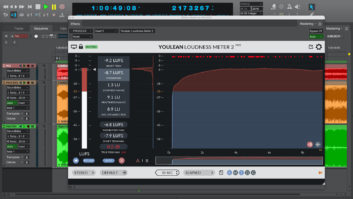Frank Wells
[email protected] During a Producers and Engineers Wing “Quality Sound Matters” event earlier this year, mastering luminary Bob Ludwig addressed the ongoing issues of the loudness wars and the overuse of compression and limiting.

As reported in PSN in June, Ludwig pointed out that a tool within iTunes, Sound Check, will analyze an iTunes library, assigning a metadata value for apparent volume in comparison to a standard. With Sound Check enabled, simple level control is applied at playback to maintain consistent loudness. He hypothesized that if Apple would turn Sound Check on by default, “it will make the disparity between the softest and loudest records not be so wide and it will end the loudness war.” Sound Check will also analyze by album, and maintain the inherent variations in loudness from cut to cut when a full album is played.
During the 135th AES Convention in New York (covered extensively throughout this issue), mastering engineer and audio quality advocate, Bob Katz, issued a press release boldly titled “The Last Battle Of The Loudness War Has Been Won,” in which he declared victory at hand in the “debilitating loudness war.”
“I have just completed loudness measurements of iTunes Radio using iTunes version 11.1.1.” stated Katz (digido.com). “iTunes Radio’s audio levels are fully-regulated, using Apple’s Sound Check algorithm. This is a very important development.” Katz based his claim on hours of testing, monitoring the output of several iTunes stations, and concluding that each song’s loudness averages -16.5 LUFS, usually within +/-1.5 dB. Katz interpreted the Apple release notes statement that version 11.1.1 “improves stability,” as meaning that Apple solved some loudness regulation issues which were present in the previous iTunes release. “The way to turn the loudness race around right now, is for every producer and mastering engineer to ask their clients if they have heard iTunes Radio. When they respond in the affirmative, the engineer/producer tells them they need to turn down the level of their song(s) to the standard level or iTunes Radio will do it for them.”
Katz further suggests that, “The engineer/producer should also tell their clients to turn on Sound Check in iTunes to hear their music exactly the way they will be broadcast on iTunes Radio…There is so much available peak headroom now in iTunes Radio that anyone who wants to master their songs with more conservative levels and prefers higher peak-to-loudness ratios will produce music with immediate loudness and sound quality advantages, compared to what’s being played out there now. The cream will soon rise to the top. The music will sound better, even a bit louder, and will attract more listeners. iTunes Radio is already so popular that it will end the loudness race by force majeure. This development is a great opportunity for producers to explain and demonstrate to their clients how to make their songs sound better on iTunes Radio and everywhere else.”
Katz notes that the Sound Check algorithm is on by default in iTunes Radio and cannot be turned off. As Lugwig elaborated, Sound Check is not on by default in iOS devices like iPods and iPhones. By enabling Sound Check, users of these devices can realize the same loudness management functionality as is native in iTunes Radio.
The algorithm functions by applying simple, linear gain control, basing the adjusted level on the calculated levels of the elements within an audio catalog. The effect is a direct corollary to a listener balancing levels song-to-song with a volume knob, but done automatically before a song starts.
My personal experience is that when using Sound Check, I can finally set and forget the volume when listening to an iTunes playlist (till ready to rock out). If you own an iOS device and/or otherwise use iTunes, ensure you have the latest iTunes version downloaded and enable Sound Check. Encourage your friends and clients to do the same. Let’s hope Apple makes this functionality the default in all its devices, and other playback systems soon employ similar functionality.







